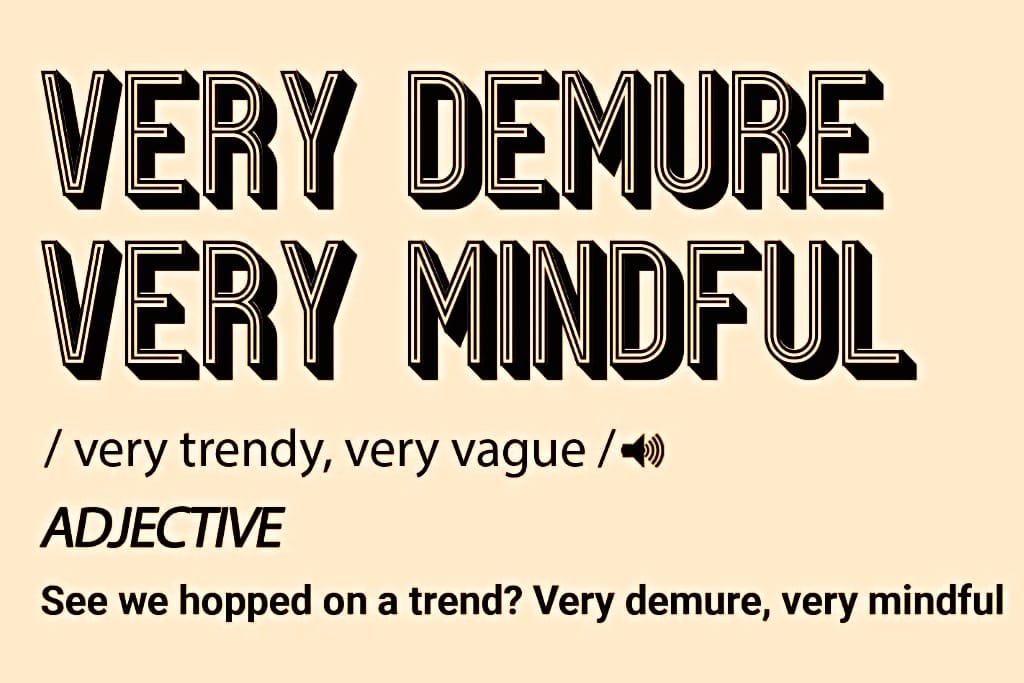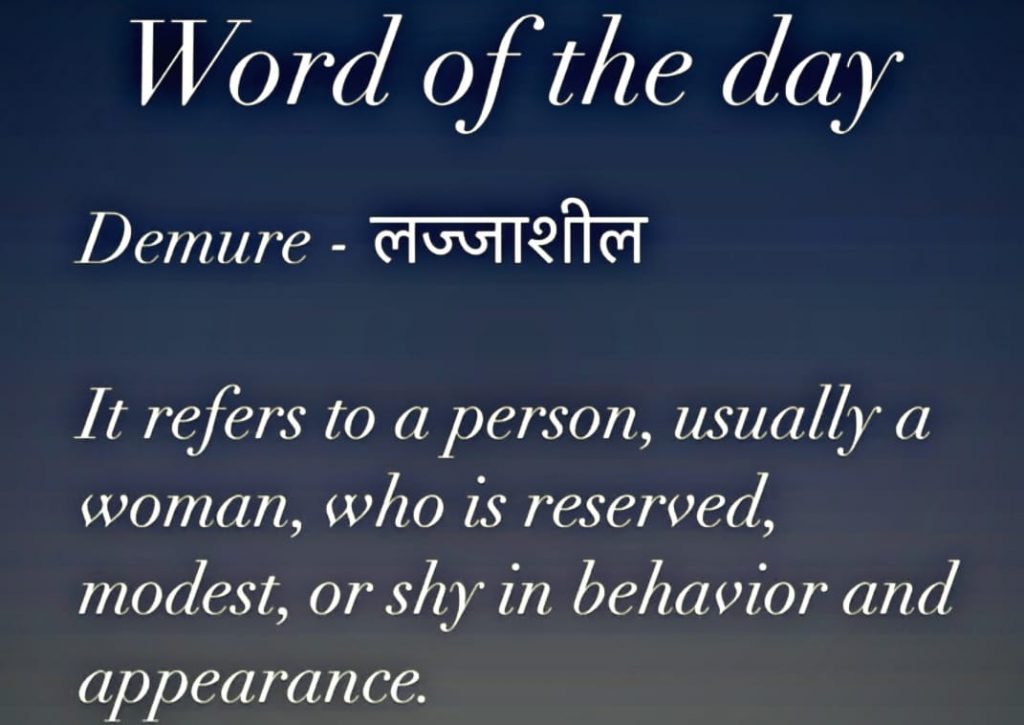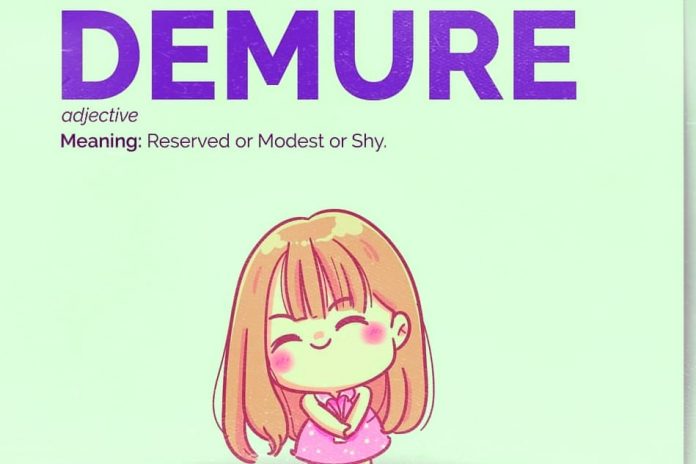The word Demure Meaning has a rich, layered meaning that can add depth to our understanding of character traits and behavior in both literary and everyday contexts. Its usage spans across cultures and centuries, making it a timeless term. But what exactly does it mean to be “demure,” and how is the word employed in modern language? This article will delve into the definition of Demure Meaning , its etymology, the nuances of its usage, and provide insightful examples. Along the way, we will touch on related concepts, historical significance, and how to use the term effectively in writing and conversation.
Demure Meaning and Definition

At its core, demure is an adjective that describes a person—usually a woman—who exhibits modesty, reserve, or shyness in behavior, appearance, or manner. The word often implies a certain quiet, humble demeanor, or one that may seem modest but can also be associated with a touch of refinement or charm. It is not always negative in connotation; often, it suggests a quiet grace or subtle beauty that contrasts with more overt or extroverted characteristics.
The term can be used to describe both outward actions (like speaking softly or dressing conservatively) and internal states (such as a reserved or introspective personality). In other words, demureness implies more than just a lack of boldness; it suggests a dignified, graceful restraint.
Demure Meaning Examples:
- “Her demure smile made her seem both approachable and mysterious.”
- “The young woman’s demure behavior at the party caught the attention of her peers.”
The idea of Demure Meaning is often linked to cultural expectations of femininity, though in modern usage, it can refer to individuals of any gender. However, traditionally, it was used to describe women, particularly in contexts where modesty and propriety were highly valued.
Etymology of Demure Meaning
The word demure has roots in the Middle French word demorer or demeurer, Demure Meaning “to remain” or “to stay.” Over time, the word evolved, acquiring connotations of remaining quiet or reserved in one’s demeanor. The spelling and pronunciation shifted, and by the 16th century, the word appeared as demure Meaning in English, initially used to describe a more serious, contemplative attitude.
The evolution of its meaning is tightly intertwined with cultural ideas about virtue and modesty. In centuries past, societal expectations often dictated that women, especially, should exhibit qualities of restraint and quietness, qualities often associated with purity and good character. Today, the word has broadened in scope, with modern interpretations often focusing on elegance, subtlety, or even shyness.
Nuances of Demure Meaning: Shyness vs. Grace

While demure Meaning often implies shyness, the term has a distinct nuance that sets it apart from other words like “bashful,” “timid,” or “introverted.” Being demure suggests an intentional or deliberate modesty rather than a passive or nervous form of shyness. A demure individual might not be afraid of attention but simply chooses not to seek it out in an overt or brash manner.
In many cases, Demure Meaning describes someone who is poised and composed. It can be used in positive contexts, suggesting that a person exudes a calm, composed demeanor. The word often carries connotations of grace and sophistication—someone who, despite their quiet demeanor, commands respect and admiration.
Cultural Significance of Demureness
In Western culture, especially during the Victorian era, demure Meaning was a highly prized trait for women, symbolizing modesty and virtue. Women were often expected to maintain a reserved and gentle appearance, embodying qualities such as humility, propriety, and grace. These traits were seen as indicators of a well-mannered and respectable person.
In literature and media, demureness became synonymous with an idealized version of femininity. Characters who were demure were often depicted as virtuous, poised, and morally upright. However, this cultural ideal also imposed significant restrictions on personal expression, particularly for women, who were expected to conform to societal expectations of behavior.
Today, while cultural ideals have shifted significantly, the concept of demureness still persists in some contexts. It is frequently associated with a more classic or traditional form of elegance, particularly in social settings where restraint and decorum are valued.
Demure in Literature and Media

In literature, demure Meaning often appears in the characterization of female protagonists. The term is used to describe heroines who are refined, delicate, and possess an inner strength that is not immediately obvious. In many classic novels, demure heroines are depicted as models of virtue and propriety, making them ideal candidates for romantic plots or for navigating the moral dilemmas of the narrative.
For instance, in novels like Jane Austen’s “Pride and Prejudice,” characters such as Elizabeth Bennet and Jane Bennet are portrayed as demure in their actions, though their inner lives and character development reveal layers of depth that defy mere surface-level modesty. These characters often struggle with societal expectations about women, yet they are able to assert their agency within the confines of social propriety.
Similarly, in classic films, the archetype of the demure Meaning woman often serves as a foil to more assertive, bold characters. In such narratives, the demure individual may be portrayed as a figure of grace and dignity, offering a different kind of strength that is not based on outward displays of power but rather on inner resilience.
The Psychological and Social Aspects of Being Demure
From a psychological standpoint, demureness may be linked to introversion, although it is not synonymous with it. While introverts often feel drained by social interactions, demure individuals might engage socially but do so with a sense of restraint. This might manifest as being less likely to dominate a conversation, preferring to listen more than speak, and avoiding behavior that could draw undue attention to themselves.
The social implications of demureness are significant as well. In many cultures, particularly in more conservative or formal social settings, demure individuals might be seen as more approachable and respectable, which can afford them social advantages. On the other hand, in more modern, progressive settings, being too demure might be viewed as a lack of confidence or even as an unwillingness to assert oneself.
Demureness can also be interpreted as a form of emotional intelligence, suggesting a person who is attuned to their surroundings and able to adjust their behavior to fit the context. It requires a level of self-awareness and understanding of social dynamics, allowing a demure individual to blend in or stand out, depending on the situation.
Demure vs. Other Terms: Modesty, Shyness, and Timidity

It’s important to distinguish between demure and other similar adjectives like modest, shy, and timid. While they all touch on elements of reserved or restrained behavior, they carry different connotations:
- Modesty implies a lack of arrogance or pretension. A modest person may avoid boasting or drawing attention to their achievements. Modesty can also refer to the way one dresses or behaves in a humble, unassuming manner.
- Shyness describes a feeling of discomfort or nervousness in social situations. A shy person may avoid interaction or struggle to communicate with others because of social anxiety.
- Timidity refers to a lack of courage or confidence, often in the face of challenge or adversity. Timid individuals may hesitate to assert themselves or take risks, sometimes out of fear.
Demure, on the other hand, is not rooted in fear or insecurity. It suggests a purposeful restraint, a decision to hold back or present oneself with grace rather than assertiveness. In this sense, demureness can be seen as a more active choice than shyness or timidity.
How to Use “Demure” in Everyday Language
Knowing how to use the word demure Meaning correctly can enrich your vocabulary and improve your writing. Here are some examples of how the word can be employed in different contexts:
- In describing behavior: “Her demure nature made her the perfect candidate for the role of the quiet, introspective artist.”
- In describing appearance: “The bride wore a demure, lace dress that accentuated her elegance without being overly elaborate.”
- In describing personality: “Although outwardly demure, he was surprisingly assertive when it came to standing up for his beliefs.”
- In describing fashion: “The actress’ demure style was both classic and modern, favoring subtlety over bold, attention-grabbing trends.”
In writing, you might choose demure Meaning over words like “shy” or “timid” to convey a sense of intentional, composed restraint. It’s an excellent word for character development, especially when describing people who are soft-spoken, elegant, or reserved.
Conclusion – Demure Meaning
To be demure Meaning is to embody a graceful restraint, a quiet elegance, and an intentional modesty in behavior, appearance, or personality. The word has a long history rooted in cultural ideals of modesty, particularly for women, but its modern use has broadened to encompass anyone who exhibits composed, reserved behavior.
The term evokes an image of dignity and poise—of individuals who choose to remain understated yet commanding in their own way. Whether used in literature, fashion, psychology, or everyday conversation, demure Meaning is a word that conveys subtle strength, inner confidence, and a refined elegance that contrasts with more overt forms of expression.
Understanding the full depth of demure Meaning helps not only to enrich your vocabulary but also to appreciate the diverse ways in which personality, behavior, and appearance can be described. It invites us to reconsider the value of restraint and subtlety, qualities that are often overlooked in today’s fast-paced, attention-driven world.

